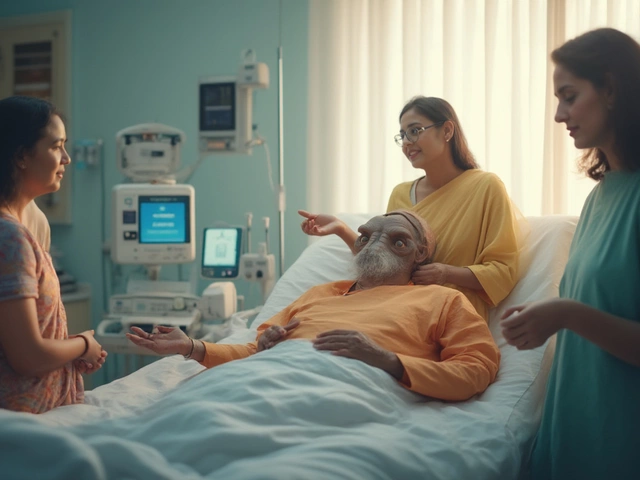Some cancers are tougher than others, but a few stand out as easier to fight—and thyroid cancer leads the pack. This article breaks down why certain cancers respond better to treatment, what sets them apart, and what practical steps you can take if you or someone you care about is facing a diagnosis. You'll find facts about survival rates, early warning signs, and why routine checks matter. Get clear, direct tips on what affects your chances, and learn the real deal about treatment options for the most beatable cancers.
Read MoreThyroid Cancer: What You Need to Know Right Now
Finding a lump in your neck can be scary, but most thyroid bumps are harmless. Still, a few turn into thyroid cancer, and catching it early makes a big difference. In this guide we’ll walk through the most common signs, how doctors find out if it’s cancer, and what treatment options you have in India.
Key Symptoms to Watch For
Thyroid cancer often shows up as a small, painless nodule that you can feel when you swallow. Look out for these red flags:
- New lump or swelling at the front of the neck.
- Hoarseness or voice changes that don’t go away.
- Difficulty swallowing or a feeling of something stuck.
- Pain that spreads to the ears or jaw.
- Rapid growth of a known thyroid nodule.
If any of these show up, book an appointment with an ENT specialist or an endocrinologist. Don’t wait for the lump to get bigger – early tests are easier and give better outcomes.
How Doctors Diagnose Thyroid Cancer
Diagnosis starts with a simple physical exam and an ultrasound. The ultrasound image tells the doctor whether the nodule looks suspicious. If it does, the next step is a fine‑needle aspiration biopsy – a quick needle prick that pulls a few cells for lab review. Blood tests for thyroid hormones (TSH, T3, T4) help understand if the gland is working normally.
In India, most major hospitals like AIIMS, Apollo, and Fortis have dedicated thyroid clinics. They can do the ultrasound, biopsy, and even a whole‑body scan (CT or PET) if the cancer has spread.
Treatment Options Available in India
The first line of treatment is usually surgery. A total thyroidectomy removes the whole gland, while a lobectomy takes just one side if the cancer is small. Indian surgeons are experienced in minimally invasive techniques that cut down recovery time.
After surgery, many patients receive radioactive iodine (I‑131) therapy. It targets any leftover thyroid cells without harming other tissues. This treatment is widely offered in government cancer centers and private clinics.
If the cancer is aggressive or has spread, doctors may add targeted therapy drugs like lenvatinib or sorafenib. These medicines are approved in India and can shrink tumors when surgery isn’t enough.
Living with Thyroid Cancer – Practical Tips
Recovery after thyroid surgery usually takes 1‑2 weeks. Keep your incision clean, follow your doctor’s instructions on calcium supplements (the parathyroid glands can be affected), and attend all follow‑up appointments.
Regular thyroid hormone replacement pills are needed for life after total thyroidectomy. Most Indian pharmacies carry levothyroxine, and your doctor will adjust the dose based on blood tests.
Stay active, eat a balanced diet rich in fruits, vegetables, and lean protein, and avoid smoking. Stress management techniques like yoga or meditation can also help keep hormone levels stable.
Finally, join a support group. Many cities have thyroid cancer patient circles, and online forums let you share experiences with people who understand what you’re going through.
Thyroid cancer can be scary, but with early detection, proper diagnosis, and the right treatment plan, most people lead normal, healthy lives. Keep an eye on your neck, act quickly if you notice changes, and lean on India’s growing network of specialists to guide you through every step.





